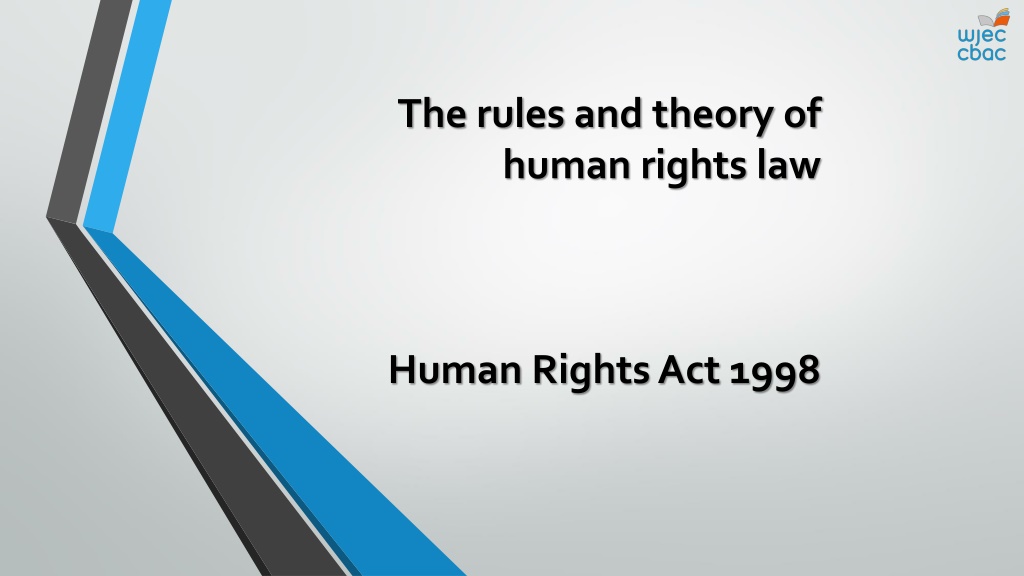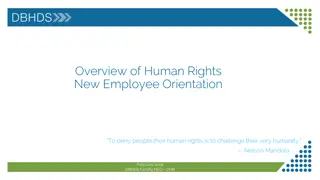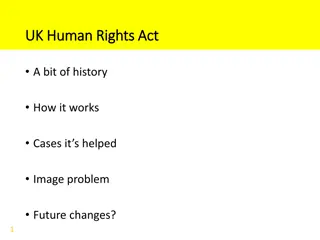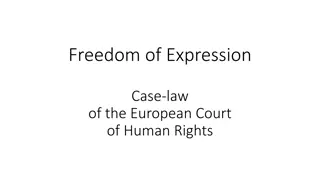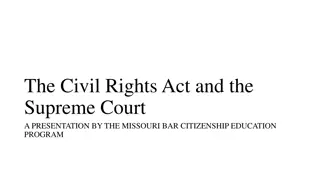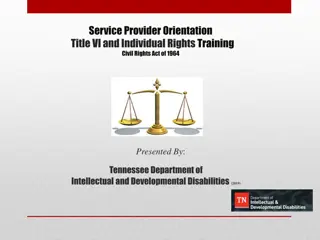Understanding the Implications of the Human Rights Act 1998
Explore the key provisions of the Human Rights Act 1998, its impact on the protection of human rights, and the way it influences legal proceedings. Delve into Sections 2, 3, 4, 6, 7, and 19, analyzing their significance and evaluating potential reforms to the Act.
Download Presentation

Please find below an Image/Link to download the presentation.
The content on the website is provided AS IS for your information and personal use only. It may not be sold, licensed, or shared on other websites without obtaining consent from the author. Download presentation by click this link. If you encounter any issues during the download, it is possible that the publisher has removed the file from their server.
E N D
Presentation Transcript
The rules and theory of human rights law Human Rights Act 1998
Objectives Explain and apply the main provisions of the Human Rights Act 1998 and relevant cases, with particular reference to sections 2,3,4,6,7 and 19. Explain the impact of the Human Rights Act on how human rights are protected. Critically evaluate the Human Rights Act and suggest reforms.
The Human Rights Act 1998 How has the Human Rights Act 1998 affected how our rights are protected? HRA 1998 incorporated the ECHR (and 1stprotocol) into domestic law came into force in October 2000. Section 7-Convention now directly applicable in UK courts, no need to go to Strasbourg (but possible as a last resort).
The Human Rights Act 1998 Before the Human Rights Act taking a case to Strasbourg could take up to 6 years. The Convention rights now incorporated into the Human Rights Act, therefore we can take a case directly to our own courts -an appeal to the European Court is still possible as a last resort.
The Human Rights Act 1998 Section 2 domestic judiciary must take into account any relevant jurisprudence - this requires the courts to take into account any relevant judgments from the European Court of Human Rights, but they are not bound by them. Section 2 creates a weak obligation on judges.
The Human Rights Act 1998 Section 3 requires that : So far as it is possible to do so legislation must be read and given effect in a way which is compatible with the Convention rights .
The Human Rights Act 1998 Section 6 unlawful for public authorities to act in a way which is incompatible with Convention rights. Public body includes, local/ central Government, police, NHS etc. Meaning of public authority considered in Donoghue v Poplar Housing & Regeneration Community Association Ltd (2001) - public authority could include a housing association as by providing accommodation it was fulfilling the Local Authority s statutory obligation.
The Human Rights Act 1998 Clear therefore from section 6 that citizens can enforce rights against the state (vertical effect). Convention however has very limited form of horizontal effect (individuals against other individuals) see: Douglas v Hello (2001) & R (on the application of Al- Skeini) v Sec of State for Defence (2007).
The Human Rights Act 1998 Section 6 unlawful for public authorities to act in a way which is incompatible with Convention rights. Andrews v Reading BC (2005) Reading BC had to pay compensation for failing to consider Andrews convention right to peaceful enjoyment of his possessions when implementing transport policy in Reading which resulted in more traffic passing his home.
The Human Rights Act 1998 Section 19 All Bills must contain a written statement as to whether the Bill is compatible with the Convention.
The Human Rights Act 1998 HRA limitations - laws which are incompatible with Convention rights are still valid - judges cannot strike them out (upholds principle of Parliamentary sovereignty). However if Courts find legislation to be incompatible they can issue a declaration of incompatibility section 4.
The Human Rights Act 1998 Section 4 -declarations of incompatibility See: Wilson v First County Trust (2003) House of Lords issued a declaration that a provision of the Consumer Credit Act 1974 was incompatible with the Convention. Procurator Fiscal v Brown (2000) Bellenger v Bellenger (2003) A and Z and others v Secretary of State for the Home Department (2004)
The Human Rights Act 1998 Section 4 - declarations of incompatibility In small groups discuss: Does section 4 give judges too much power, or does it not go far enough? Should judges be able to strike out laws that are incompatible with Convention rights?
The Human Rights Act 1998 Other important cases to note: Re JJ (control orders) (2006) Re MB (2006) R (on the application of Shabina Begum) v Head Teacher and Governors of Denbigh School (2006) Ali v Head Teacher and Governors of Lord Grey School (2006)
The Human Rights Act 1998 In small groups research/ discuss the advantages and disadvantages of the Human Rights Act 1998. Consider recent publicity surrounding the Act and comments from both Labour and Conservative leaders - David Cameron wants to scrap it. Should we scrap the Human Rights Act? Do you think that the Human Rights Act has given greater protection to people against breaches of Human Rights?
The Human Rights Act 1998 Advantages Improved access Encourages conformity Avoids conflict between UK domestic law and international law Better awareness of rights by citizens ECHR has been tried and tested over 30 years
The Human Rights Act 1998 Disadvantages HRA not entrenched Too much judicial power? Too little judicial power? Cannot strike out laws Rights in the Convention only enforceable against the state and not private individuals ECHR is old, outdated, does not include social/ economic rights
The Human Rights Act 1998 The main problem with the Human Rights Act is that it is not ENTRENCHED - this means it is not permanent and so any new government could scrap it. We have no entrenched laws in this country, unlike America that has a Bill of Rights.
Summary of protection of Human Rights pre and post HRA Pre Act Post Act Applicability of the ECHR No direct effect Convention had persuasive influence Convention rights now directly applicable Case Law of ECtHR Courts reluctant to apply case law of the Convention Under Section 2 duty to take into account case law of the ECtHR Interpretation of statutes Presumption against interference with fundamental rights Must interpret laws in light of Convention rights wherever possible Section 3 Validity of primary legislation No power to question or strike out an Act of Parliament Power of higher courts to issue declarations of incompatibility Section 4
Reform Commission for Equality and Human Rights set up 2007 - fully operational 2009. Functions include: Providing advice and guidance Conducting inquiries Bringing cases Monitoring the ECHR in domestic law Scrutinising new laws Publishing regular reports
Useful websites www.opsi.gov.uk ( HRA 1998) www.echr.coe.int/echr - website of the European Court of Human Rights
Test yourself 1. What did the HRA incorporate into UK domestic law? 2. When did the Act come into force? 3. What does section 2 require the judiciary to do? 4. Under what section can judges issue a declaration of incompatibility? 5. Name some cases where they have done this. 6. Against whom can you enforce the rights in the Convention? 7. List 3 advantages and 2 disadvantages of the HRA.
